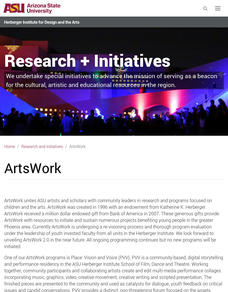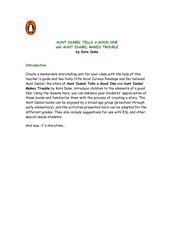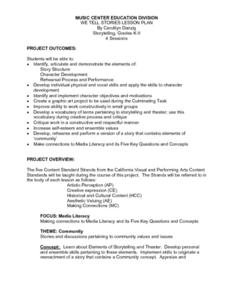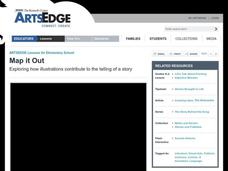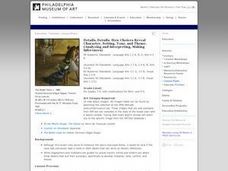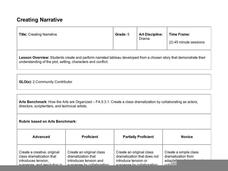Curated OER
Character and Plot Development Through Comics
Third graders are introduced to character, plot development, point of view, and tone through the use of comic strips. They, in pairs, identify these four attributes in the comic strip and present their findings to the class.
Curated OER
Character Development - Flora
Watch video clips that illustrate a character's development. Your class can watch video's about a character and her development through a life decision. They then complete a timeline activity for the story.
Curated OER
Animation Pre-Production
Does your class love reading cartoons? Use their talents and interests to examine the process of writing a story they wish to tell through a cartoon. They develop the beginning, middle, and end of a story based on their original...
Curated OER
Applying Character and Setting to Play Readings
Read Ira Sleeps Over, then identify elements of plays that are also common to books. Learners analyze character and setting, consider how these elements relate to a play, then write a one-paragraph skit using the characters from Ira...
Curated OER
Twisted Tales
Experience how a story can drastically change when the point of view is altered. Young scholars first read a review of Disney's film Tarzan, focusing on how the point of view in the classic story is important. They then select...
Curated OER
Creating Plays from Children's Stories
Students explain how individual elements (e.g., plot, theme, character, conflict, etc.) comprise the structure of a play. They write an original one-act play with developed characters, specific setting, conflict, and resolution.
Curated OER
Retelling Stella Louella's Runaway Book: Point of View
Stella Louella’s Runaway Book launches a study of point of view and storytelling. After reading the tale, class members retell the story from the point of view of another character. The scripted plan, developed by a teacher candidate,...
Curated OER
Creating an Original Opera
This may be a lot to ask of a high schooler, but then again, who knows? Pupils work in groups to explore, write, and then perform an original opera. They view versions of The Magic Flute and La Traviata, then compose a plot, characters,...
Curated OER
Aunt Isabel Tells a Good One...
Explore language arts by reading two similar stories in order to compare and contrast them in class. Young readers read two Aunt Isabel books, by Kate Duke, and discuss the main characters, plot, and setting. They complete a graphic...
Curated OER
Setting the Scene with Paint
Learners consider different story settings and how they add to character and plot development. They choose settings to recreate in three dimensions using stencil, printing, and stamping techniques with paint.
Curated OER
Introduction to Drama
Introduce your class to drama! You cast each pupil as a different character from a story you have read. They are given a general outline of the scene, act out the scene multiple times, then discuss the weak and strong aspects of each...
Curated OER
Dear Diary
Students analyze a piece of writing by creating diary entries based on a character. In this reading comprehension lesson, students read an assigned book with their classmates and create a sketch of what they believe the main...
Curated OER
We Tell Stories
Young readers bring characters to life by working in small groups to script and perform stories that contain a community concept. Detailed questions and activities are outlined for the class. Consider having your groups create...
Curated OER
Drama: Learn A Lesson from the Lion
Reading is reading, whether it's for drama or English class. Boost reading fluency, accuracy, intonation, and comprehension while fostering creative acting skills. Kids read the provided tale of "The Lion and the Mouse" several times in...
Curated OER
Map It Out
Explore how illustrations add to a story. Young learners will look at picture books to see how the pictures tell the story. They create illustrations to go with a chosen story, and then flip the activity so they have to write a story to...
Curated OER
Details, Details: How Choices Reveal Character, Setting, Tone, and Theme. (Analyzing and Interpreting, Making Inferences)
Students respond to works of art. In this art interpretation instructional activity, students examine images of art while using concepts they learned as they read literary pieces. They detail the setting, characters, and the mood and...
Curated OER
Design a Book Cover
Students use the programs Pics4Learning and ImageBlender 3 to apply their knowledge of characters, plot, setting, symbolism, and conflict to design and create a book cover. Designed as a culminating literature activity.
Curated OER
Learning to Analyze Characters
Students discover writing strategies authors use to enhance characters. In this character writing lesson, students are read the Knuffle Bunny books by Mo Willems and analyze the story, characters and settings as they listen....
Curated OER
Narrative Writing Outline
Students explore the elements of a narrative for its purpose, type of audience, mood, main character, minor characters, setting, and conflicts in the story. A story outline is developed and a five paragraph essay composed in this lesson.
Curated OER
Shakespeare 2000
Young thespians can try their hand at writing a script and acting out a scene, while gaining a deeper understanding of the universal topics presented in Shakespeare's wide array of plays. Begin the lesson by conducting a compare and...
Hawaiʻi State Department of Education
Comparing Themes
The tale of "Lon Po Po" is a Chinese story, very similar to the European tale of "Little Red Riding Hood." Learners make cross cultural comparisons between the two tales, focusing on themes common to both. They review story elements such...
Hawaiʻi State Department of Education
Creating Narrative
Plot, setting, characters, and conflict are common to both drama and narrative stories. Kids create narrated tableaus that show their understanding of the plot, setting, and conflict of a story they've recently read. The lesson plan...
Hawaiʻi State Department of Education
Story Design
Stories contain very specific elements; plot, characters, and key events. Learners use pantomime to retell a key event from the beginning, middle, and end of a story. They discuss setting and character as each group discusses and then...
Curated OER
Crane, London, and Literary Naturalism
Students analyze "To Build a Fire" by Jack London and "The Open boat" by Stephen Crane. They write an essay in which they compare and contrast the narrators and plots in each story.





